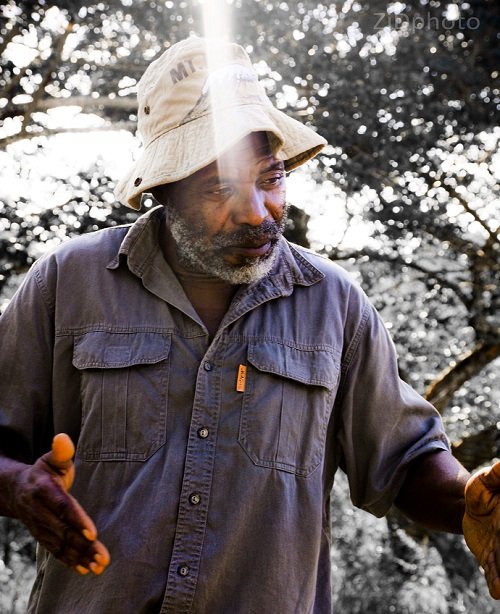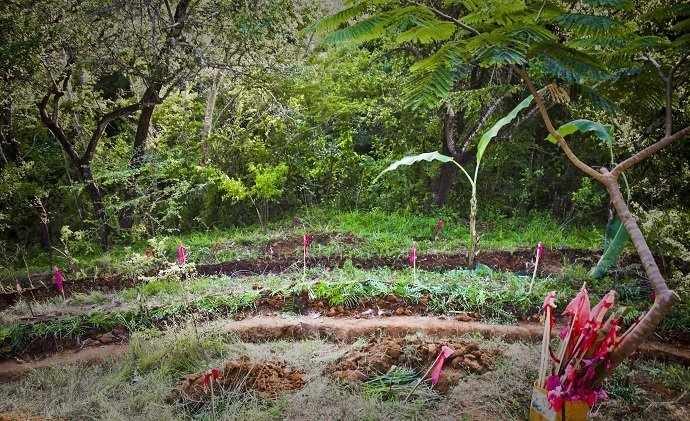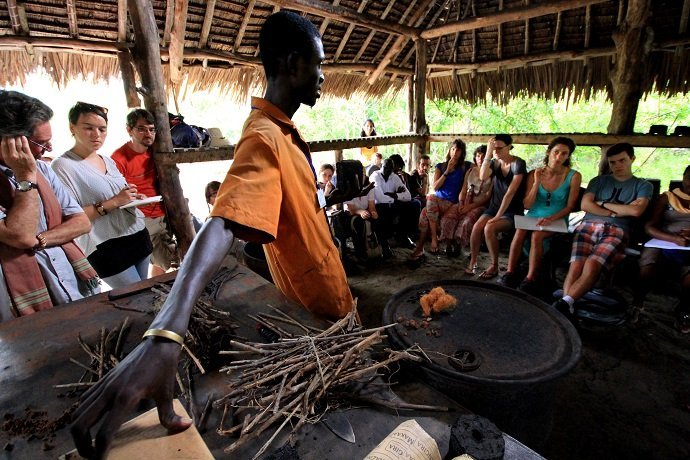
Permaculture Swaying on the Stunning Emerald Waters of Kilifi, Kenya
It’s no secret that Tom and Romain Mari have totally transformed Kilifi. With their tireless enthusiasm, style, passion, sweat and tears they have managed to create the coolest place on the East African Coastline: Distant Relatives Eco lodge and Backpackers. When we first met them in 2011, we kicked it off immediately; their visions of creating a masterpiece that would re-ignite a sense of global community and a positive scene is certainly an understatement of their efforts so far. That’s right, D.R. has become a global icon for sustainability, togetherness, a collective of good music, and a slice of paradise all crammed into 3 coastal acres of forested production gardens, eco-accommodation, entertainment, and more.
Having rebuilt the majority of the infrastructure at DR Tom and Romain have managed to up cycle and renovate the place using locally sourced material and recycled materials from the beach. During the rainy seasons, they use all their roofs for rainwater harvesting to supply the kitchen, the gardens, the showers, and some of the pool with water. They have also built 7 spacious and comfortable bandas using an ancient Mexican cobbing technique, each fitted with composting toilets to further add to the ecological design system they employ. Further to that, the property has an abundance of poultry, pigs, guinea pigs, ducks, and guinea fowl which all make their contributions to the kitchen. Since a few months, schools and university students as well as guests have started joining Distant Relatives Eco-Tours – learning about sustainability, permaculture, eco-building and all kinds of interesting things!
During sundowners overlooking the beautiful creek below, we often had long chats about permaculture; what it can achieve and how it could fit into the DR set up. Naturally, the stories came out of their travels through Africa in search of “the mecca” to set up their dreams and visions. In nearly all those stories, the Ethiopia chapter came up, as they would ramble on in detail about what they saw there. They had the pleasure of witnessing the work that permaculture guru Tichafa Makovere had created in schools and at Strawberry Fields Eco lodge.


Tichafa Makovere, born in Zimbabwe some 60 years ago, is THE permaculture man for Africa. His childhood background was spent on his father’s farm where he gained both traditional as well as progressive knowledge on plants and animals. More importantly, he was brought up knowing how they interact with each other in natural and anthropogenic ecosystems; one of permaculture’s most intrinsic models. He went on to becoming a schoolteacher and high school Principal where he gained insight into affecting the minds of students and parents of all ages. This gave him the confidence to teach, persuade, discipline, and engage people; a major skill set when trying to spread radical ideas such as permaculture in a continent like Africa where culture and heritage still play such large roles in the everyday life affairs. Now, Tichafa has more than 25 years of permaculture experience and has influenced the landscapes and the people of many African nations. He was our permaculture teacher, our Babu Jembe, and our Captain during the first two-permaculture courses held at DR last year.
On the first PDC course, in partnership with Permaculture Research Institute of Kenya (PRI Kenya), we focused our physical efforts on pruning and cropping the densely forested property to provide space for designing and implementing the zone 0 and zone 1 intensive kitchen gardens. The sandy soils needed tons of compost, manure, and mulch, which have contributed massively to the soil’s present fertility. Each group was given a designated area to design and complete by the end of the course. We also did some earthworks on contour and got the sloped sections of the property designed to control water run-off and nutrient flow by putting in swales and small terraces. These were planted up with lemongrass, sweet potato, watermelon, and fruit trees. Furthermore, we got the composting areas properly layered and organized; a lot of which is constantly contributing vitality to the humus layer in the intensive gardens. From all this, a nursery was created that stores young vegetables, fruit trees, indigenous trees, and nitrogen fixing shrubs and plants.

The second course complemented the first in that we took our physical efforts even further by creating a small food forest, which get fed by the grey/black water coming from the kitchen after being oil-filtered. The entire perimeter was planted up with pineapple and lemongrass, while the car park and pathways got lined with papaya and banana trees. The gardens around the bandas were designated to individual groups as course projects, while a wormery was put up to produce castings and worm composting tea. Layered compost heaps were sporadically set up throughout the entire property while varieties of fruit trees were planted in a scattered fashion amongst the gardens and terraced hills.
Field trips and guest speakers were a highlight on both courses. Visits to local projects like Wild Living, Kilifi Plantations, and personal homeowners and small-scale farmers provided the students with plenty of ideas and knowledge to take back home with them. Guest speaker topics included: apitherapy, biogas systems, aquaponics & fish farming, citrus farming, grafting & budding, indigenous tree nursery practices, and eco building design & architecture. Lastly, designing a permaculture plot on a nearby primary school added a sense of community development to the courses; again, a key feature in permaculture ethics.


The next course in November should be particularly interesting and inspirational. This time we have the pleasure of welcoming and working alongside one of USA’s most prominent Permaculture professionals: Jeremiah Kidd from Sante Fe, USA. Jeremiah Kidd is an internationally renowned permaculture designer and educator from Sante Fe (New Mexico, USA). Jeremiah has been working in the Permaculture, natural building and alternative technologies field for over 20 years with a passion for enhancing productive relationships between people and their surroundings. In 2000 Jeremiah established San Isidro Permaculture, a design and installation company focused on permaculture design, water catchment, grey water systems, edible plant landscapes, and erosion control & land restoration in the USA, Latin America, Africa and Asia. Jeremiah was part of the Earthship project, probably what remains today as the world’s most admirable ‘radical sustainable architecture’.
This an intensive 14 day course, participants will go through the complete process of designing and implementing a permaculture plan. We will learn the concepts of sustainable living and improved self-reliance and attain hands on experience of design and implementation. Participants will learn how to develop sustainable systems which can be applied to all aspects of life through the observation and replication of natural patterning. We will learn how to create regenerative systems that provide for our basic needs while enhancing the environment, using a variety of learning techniques and strategies. Permaculture is an integrated design strategy incorporating food forests and jungle gardens, natural building, alternative economics, aquaculture and mapping to create a sustainable human habitat. We present an innovative approach through modelling the structure of Permaculture directly in the environment.
This course will be presented through lectures, design approaches, guest presentations, group discussions, practical exercises, hands-on projects, projections, presentations, along with several site visits and field trips. This workshop will present Permaculture with various applications in mind such as Design Priorities and Efficient Site Layout, Ecological Building, Integrated Pest Management, Water Harvesting & Grey water Systems, Swale design and other erosion prevention methods, Increased and Resilient Bio diverse Food Production, Food Forestry (including grafting and super foods), Sustainable farming and household gardening for self-reliance, Biogas and Appropriate Energy Production, Soil building, Nutrient Cycling and Composting, Composting Toilets and Sanitation, Waste Cycling (including glass cutting for glasses), Earthworks, Clean Water and Drought Proofing, Health and Nutrition, Appropriate Technologies including Rocket Stoves, Aquaculture, Bio-Sand Filtration, Broad Acre Applications, Urban and Small Scale Site Design, Alternative Economics and Community Design, as well as Livestock Integration and Beekeeping.
Jeremiah writes “I believe we can positively affect our community and ecosystem by observing natural systems and replicate what nature teaches us in a beneficial multifunction design. This can be from teaching children to restoring a watershed. This is my passion in life, seeking patterns in nature and replicating them while using as few resources as possible and in turn benefiting all.”
My passion and education in permaculture, natural building, and alternative technologies began in the late 1980s, when I lived and worked for three years at Breitenbush Hot Springs (a sustainable retreat center nestled in the Cascade Mountains of Oregon). I completed my first permaculture design course in 1992 in Pennsylvania and later moved on to live in Taos, New Mexico, where I worked for Earthship architect Michael Reynolds. In the mid 90s, as I continued studying advanced permaculture classes in the Southwest, I worked for and became a partner at Living Structures, Inc., a permaculture-based design, green building, and landscape firm in Santa Fe, New Mexico. In 2000 I established San Isidro Permaculture, a design and installation company focused on water catchment, grey water systems, native and edible plant landscapes, erosion control, and land restoration. With San Isidro Permaculture, I have served Santa Fe and the surrounding area working for the private sector, federal and local governments, the film industry, and commercial projects. I have worked on many projects, including restoration of the historic Santa Fe Trail as well as large-scale erosion control in the Los Alamos Watershed after the famous fires of 2000. While traveling internationally, I try to visit other permaculture sites. I have worked in many countries throughout Africa, Asia and Central America including Kenya, Uganda, Thailand, Indonesia, Mexico, Guatemala and the Democratic Republic of Congo. I am an accredited and certified Rainwater Catchment Professional through ARCSA (American Rainwater Catchment Systems Association).
As ex permaculture students, we are strongly spreading the word and the works that this wonderful discipline has taught us. We are now freelance consultants and working towards our teacher training natural building qualifications. We have just finished a six-month contract in Ethiopia where we set up an Eco Hub permaculture demonstration site for the Horn of Africa Regional and Environmental Centre and Network. We have furthermore founded a small outreach program called Barefoot Solutions which offers consultancy in ecological landscaping, fish farming, land regeneration, community training programs, and permaculture based gardening.
Abundance is and should always be on our doorstep!

By Sven Verwiel and Ivan Lieman
For more info about Distant Relatives Permaculture Design Course:
– November 1st to 15th PDC Course with Jeremiah Kidd Description: https://www.scribd.com/doc/269457191/Info-on-PDC-1-15-Nov-by-Jeremiah-Kidd-V2
– Facebook Event: https://www.facebook.com/events/402950783226484/
– Kilifi Facebook Permaculture Page: https://www.facebook.com/permaculturekenya?fref=ts
– Website: https://www.kilifibackpackers.com/
The cost of the course is: 600USD
To register for this course, please contact Sheena on: sheena (at) pri-kenya.org
We have many talented individuals here in Kenya who are dying to take a permaculture course and take that knowledge back to their communities to help improve livelihoods. We try and find ways to provide scholarships for as many as possible but demand is certainly higher than supply. A contribution towards our Scholarship Fund will make an enormous difference for someone here in Kenya, who can then make an enormous difference in their community with their new knowledge. We are considering farmers, teachers and community leaders who demonstrate that they are able to implement this knowledge as well as to teach and train others in their community. We believe as this knowledge spreads, it will teach them the principles of good land stewardship as well as give them the opportunity to network with international organizations.
Please help make this possible!! Contact Sheena on sheena (at) pri-kenya.org












